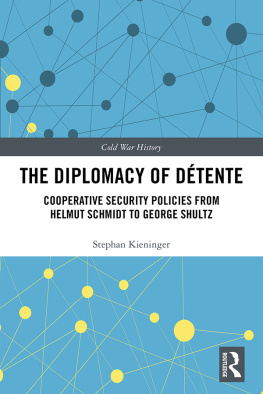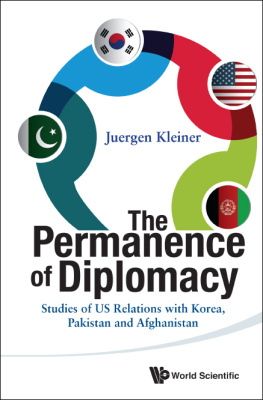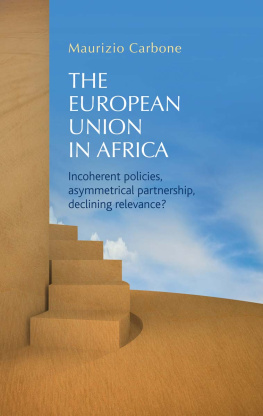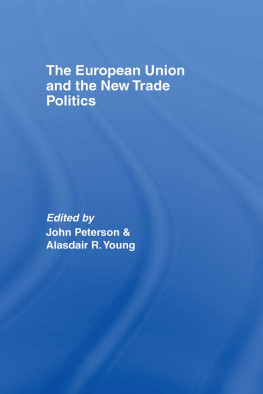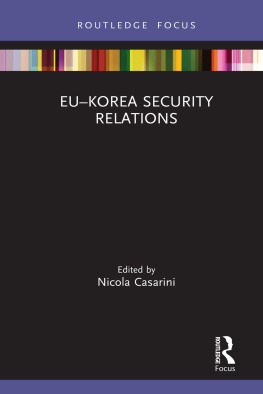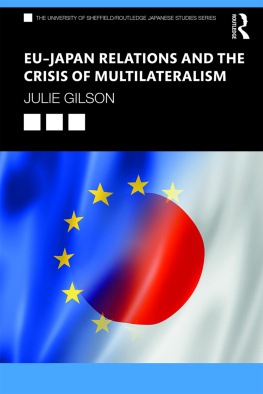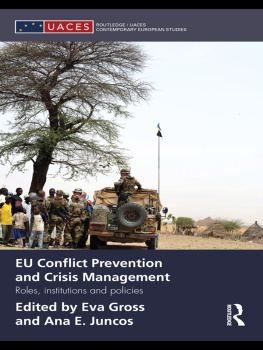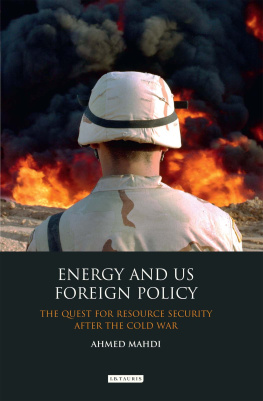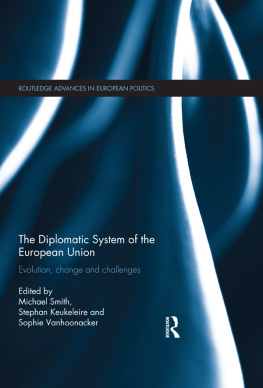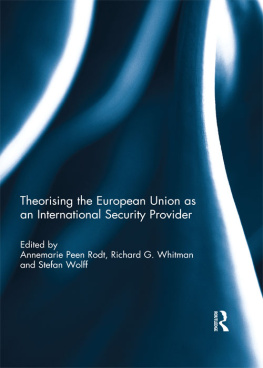The Diplomacy of Dtente
This book investigates the underlying reasons for the longevity of dtente and its impact on EastWest relations.
The volume examines the relevance of trade across the Iron Curtain as a means to facilitate mutual trust, as well as the emergence of new habits of transparency regardless of recurring military crises. A major theme of the book concerns Helmut Schmidts foreign policy and his contribution to the resilience of cooperative security policies in EastWest relations. It examines Schmidts crucial role in the Euromissile crisis, his Ostpolitik diplomacy and his pan-European trade initiatives to engage the Soviet Union in a joint perspective of trade, industry and technology. Another key theme concerns the crisis in USSoviet relations and the challenges of meaningful leadership communication between Washington and Moscow in the absence of backchannel diplomacy during the Carter years. The book depicts the freeze in USSoviet relations after the Soviet invasion in Afghanistan, the declaration of martial law in Poland, and Helmut Schmidts efforts to serve as a mediator and interpreter working for a relaunch of USSoviet dialogue. Finally, the book highlights George Shultzs pivotal role in the Reagan administrations efforts to improve USSoviet relations, well before Mikhail Gorbachevs arrival.
This book will be of interest to students of Cold War studies, diplomatic history, foreign policy and international relations.
Stephan Kieninger is an independent historian and the author of Dynamic Dtente: The United States and Europe, 19641975 (2016).
Cold War History
Series Editors:
Odd Arne Westad, John F. Kennedy School of Government, USA
Michael Cox, London School of Economics & Political Science, UK
In the new history of the Cold War that has been forming since 1989, many of the established truths about the international conflict that shaped the latter half of the twentieth century have come up for revision. The present series is an attempt to make available interpretations and materials that will help further the development of this new history, and it will concentrate in particular on publishing expositions of key historical issues and critical surveys of newly available sources.
US Strategic Arms Policy in the Cold War
Negotiations and Confrontation Over SALT, 19691979
David Tal
Neutrality and Neutralism in the Global Cold War
Between or Within the Blocs?
Edited by Sandra Bott, Jussi M. Hanhimki, Janick Marina Schaufelbuehl and Marco Wyss
Origins of the North Korean Garrison State
The Peoples Army and the Korean War
Youngjun Kim
German Reunification
A Multinational History
Edited by Frdric Bozo, Andreas Rdder and Mary Elise Sarotte
New Perspectives on the End of the Cold War
Unexpected Transformations?
Edited by Bernhard Blumenau, Jussi M. Hanhimki and Barbara Zanchetta
The Diplomacy of Dtente
Cooperative Security Policies from Helmut Schmidt to George Shultz
Stephan Kieninger
For more information about this series, please visit: www.routledge.com/Cold-War-History/book-series/SE0220
The Diplomacy of Dtente
Cooperative Security Policies from Helmut Schmidt to George Shultz
Stephan Kieninger
First published 2018
by Routledge
2 Park Square, Milton Park, Abingdon, Oxon OX14 4RN
and by Routledge
711 Third Avenue, New York, NY 10017
Routledge is an imprint of the Taylor & Francis Group, an informa business
2018 Stephan Kieninger
The right of Stephan Kieninger to be identified as author of this work has been asserted by him in accordance with sections 77 and 78 of the Copyright, Designs and Patents Act 1988.
All rights reserved. No part of this book may be reprinted or reproduced or utilized in any form or by any electronic, mechanical, or other means, now known or hereafter invented, including photocopying and recording, or in any information storage or retrieval system, without permission in writing from the publishers.
Trademark notice: Product or corporate names may be trademarks or registered trademarks, and are used only for identification and explanation without intent to infringe.
British Library Cataloguing-in-Publication Data
A catalogue record for this book is available from the British Library
Library of Congress Cataloging-in-Publication Data
A catalog record for this book has been requested
ISBN: 978-1-138-50008-2 (hbk)
ISBN: 978-1-351-01331-4 (ebk)
Typeset in Times New Roman
by Wearset Ltd, Boldon, Tyne and Wear
For Valentina
Contents
Acknowledgments
This book was made possible by a generous fellowship from the Berlin Center for Cold War Studies. I would like to express my gratitude to Bernd and Bettina Greiner: their hospitality and their contagious enthusiasm greatly helped me to write this study. I am most grateful to Bernd: he encouraged me to turn my project into a book. I enjoyed the opportunity to be affiliated with the Center. It is the kind of international research institute specializing in the study of the Cold War that had been lacking in Germany until recently. The Center is dedicated to supporting Cold War research in Germany and beyond. Four prestigious institutes have joined forces to sponsor the Center: the Hamburg Institute for Social Research, the Institute for Contemporary History Berlin-Munich, the Humboldt University Berlin and the Federal Foundation for the Study of the Communist Dictatorship in East Germany. The long-term objective is to firmly establish the Center as a leading hub for international scholarship on the Cold War. After all, Berlin, like no other city, was a focal point of the Cold War for decades.1 I benefitted from presenting my research in Berlin on several occasions: I organized a Cold War reading group seminar series with my colleagues Sabine Rutar and Benno Nietzel, and Humboldt University invited me to give a talk in its Cold War lecture series, which is jointly organized with the Center.
The German Historical Institute (GHI) in Washington, DC awarded me a travel grant to conduct research at the Jimmy Carter and Ronald Reagan Presidential Libraries as well as at the Library of Congress. Id like to express my gratitude to the GHI: Deputy Director Axel Jansen and Bryan Hart of the GHIs staff were my points of contact. It was a great pleasure to work with them. The Hoover Institution Library and Archives endowed me with a generous Silas Palmer Research Grant: I spent two weeks in Palo Alto mining a variety of holdings. I had the opportunity to interview George P. Shultz. It was a privilege to talk to Secretary Shultz and obtain his first-hand recollections on the Reagan administrations foreign policy. His extraordinary public service made the world a better place. His diplomacy shows that solutions to thorny problems must benefit both sides if they are to last.
The Hoover Archives is a splendid place for research. I would like to thank its director, Erik Wakin, for his support, his hospitality and his great interest in my research. Carol Leadenham and Anatol Shmelev were invaluable sources of support guiding me through the process of identifying key collections. I am greatly indebted to Celeste Szeto: she helped me to organize my travels and my stay at Hoover. She guided me around and introduced me to her colleagues and many Hoover fellows. I have very fond memories of Hoovers Christmas celebration, to which after a busy day at the archives I was spontaneously invited. I was very happy to participate and to spend an entreating evening in excellent company. Last but not least, I was glad to have Bernd Greiner there conducting research at Hoover simultaneously with me. During our dinners, we discovered that it was high time to write an international Cold War soccer history.

